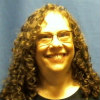A few months ago, during an informal visit in my apartment from my parents, my sister and my nephew Ian, I was stretched out on the living room floor and Ian, as five-year-olds are want to do, was walking on my back and climbing all over me. When his weight hit a spot that made my back crack, I groaned, "Oh, Ian, just call me your personal Uncle Irv," before squirming out from under all 40-something pounds of him. "Like mother, like son...like aunt, like nephew," I thought.
I remember how my sister and I used to climb all over our beloved Uncle Irv for piggy back rides and how, as part of the nightly bedtime ritual during his visits, he'd swing us around and around and around before finally tossing us from his arms through the air into our beds, amid peals of dizzy giggles and squeals of "Do it again, Uncle Irv! Do it again!" Retired from the furrier business long before I even knew what a furrier was, Uncle Irv, my maternal grandfather's brother and a confirmed bachelor, rarely uttered an unkind word, managed to see the good in even the most difficult people, and always had time for a mitzvah, frequently driving his neighbors back and forth to doctors' appointments and the grocery store. Following Ashkenazi custom, Ian is named in memory of Uncle Irv and, in fact, was born on the exact date of his yahrzeit. Although he hasn't yet finished kindergarten, in his community, Ian is known to be a kind, compassionate, generous and joyful kid (yes, I am more than a little bit biased, but his teachers, the parents of his classmates, his nanny, and his friends, as well as his grandparents, of course, concur), demonstrating, as I like to believe, that a part of Uncle Irv's soul truly lives within him. Our family's inveterate gardener, Uncle Irv spent many a day visiting his nieces and their families, often showing up while we were all at work and school and letting himself into the house with his key to await our arrival. The sight of his car-first a green Ford Torino and later, a light blue Ford Pinto (jokingly dubbed the "Death Mobile" by us after the exploding-gas-tank scandal came to light in the 1970s)-when we returned home always created a wonderful flurry of excitement. During the winter, Uncle Irv read John le Carré and James Clavell novels, browsed the latest Burpee seed catalog, carefully selecting seeds to order for next summer's garden, and relished the beef stew--his favorite --that my mother frequently cooked for him during his visits. Although he never called me anything other than "Janey, dear" (most appropriate for me, the eldest with definite first-child syndrome), my sister (also most appropriately, I thought) often was referred to as "Amy...you little vonce, you," and frequently questioned about her activities and whereabouts as in "What are you up to, you little kochleffel?" (For the non-Yiddish speakers among you, a vonce is a bedbug and a kochleffel is a cooking spoon or, more figuratively, a busy body, first dipping into one pot and then into another, which, once explained to me, describes my sister to a tee.) During the spring and summer, we'd often come home to find Uncle Irv out back, lovingly tending the organic garden he'd tenderly coaxed from the Burpee seeds ordered the previous winter. More often than not, he also was hiding--quite unsuccessfully--the forbidden cigarettes he always smoked on the sly. Perhaps the nicotine enhanced his ability to garden because despite New Jersey's red shale and lack of topsoil, every year for summers on end, Uncle Irv managed to cajole tomatoes, peppers, lettuce, cucumbers, zucchini, string beans and more from the earth, all with little more than organic fertilizer and dried pigs' blood to keep away the deer, rabbits and other critters with whom we shared our backyard. Tall sunflowers lined the fence around the garden and bachelor buttons, marigolds and strawberry vines dotted another patch he'd cultivated closer to the house. Try as he might, though, Uncle Irv could rarely get my sister or me to help with the watering, the weeding or the pinching off of the strawberry blossoms during their first season of growth. Sadly, despite his best efforts, gardening held little appeal for either of us. Perhaps my sister is right, though, and such interests, in getting passed down within our family, skip a generation or two. Regardless of whether or not Ian possesses Uncle Irv's green thumb, his strong back or his taste for beef stew, he does obviously possess Uncle Irv's loving heart, a blessing for its own sake and for his namesake. Through Ian, our beloved Uncle Irv lives on--enabling us to look back with fondness and forward with hope.
Related Posts

Harnessing the Power of our Mothers Around the Seder Table

Melding Tradition and Innovation: Our Interfaith Toddler Naming Ceremony


